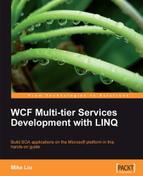 Comparing LINQ to SQL with LINQ to Objects
by Mike Liu
WCF Multi-tier Services Development with LINQ
Comparing LINQ to SQL with LINQ to Objects
by Mike Liu
WCF Multi-tier Services Development with LINQ
- WCF Multi-tier Services Development with LINQ
- WCF Multi-tier Services Development with LINQ
- Credits
- About the Author
- About the Reviewers
- Preface
- 1. SOA Service Oriented Architecture
- 2. WCF Windows Communication Foundation
- 3. Implementing a Basic HelloWorld WCF Service
- 4. Hosting and Debugging the HelloWorld WCF Service
- Hosting the HelloWorld WCF service
- Debugging the HelloWorld WCF service
- Summary
- 5. Implementing a WCF Service in the Real World
- 6. Adding Database Support and Exception Handling to the RealNorthwind WCF Service
- 7. Modeling a WCF Service with Service Factory
- What is the Service Factory?
- What are Guidance Packages?
- Preparing environments
- Differences between the December 2006 version and the February 2008 version
- Modeling the data contracts
- Modeling the service contracts
- Specifying the implementation technology for the models
- Generating source code
- Summary
- 8. Implementing the WCF Service with Service Factory
- 9. Introducing Language-Integrated Query (LINQ)
- What is LINQ
- Creating the test solution and project
- New data type var
- Automatic properties
- Object initializer
- Collection initializer
- Anonymous types
- Extension methods
- Lambda expressions
- Built-in LINQ extension methods and method syntax
- LINQ query syntax and query expression
- Built-in LINQ operators
- Summary
- 10. LINQ to SQL: Basic Concepts and Features
- ORM Object-Relational Mapping
- Comparing LINQ to SQL with LINQ to Objects
- LINQ to Entities
- Comparing LINQ to SQL with LINQ to Entities
- Creating LINQ to SQL test application
- Modeling the Northwind database
- Querying and updating the database with a table
- Deferred execution
- Deferred (lazy) loading versus eager loading
- Joining two tables
- Querying a view
- Summary
- 11. LINQ to SQL: Advanced Concepts and Features
- Calling a stored procedure
- Compiled query
- Direct SQL
- Dynamic query
- Inheritance
- Handling simultaneous (concurrent) updates
- Transactions support
- Adding validations to entity classes
- Debugging LINQ to SQL programs
- Summary
- 12. Applying LINQ to SQL to a WCF Service
- Creating the LINQNorthwind solution
- Modeling the data contracts
- Modeling the service contracts
- Generating the source code
- Modeling the Northwind database
- Implementing the data access layer
- Implementing the business logic layer
- Implementing the service interface layer
- Creating the host application and the test client
- Testing the GetProduct and UpdateProduct operations
- Testing concurrent update manually
- Testing concurrent update automatically
- Summary
- 13. Distributed Transaction Support of WCF
- Creating the DistNorthwind solution
- Testing the transaction behaviour of the WCF service
- Creating a client to call the WCF service sequentially
- Testing the sequential calls to the WCF service
- Wrapping the WCF service calls in one transaction scope
- Testing multiple database support of the WCF service
- Modifying the data access layer for the second database support
- Modifying the business logic layer for the second database support
- Modifying the service interface layer for the second database support
- Modifying the service host for the second database support
- Modifying the client for the second database support
- Testing the WCF service with two databases
- Enabling distributed transaction support
- Understanding distributed transaction support of a WCF service
- Testing the distributed transaction support of the WCF service
- Summary
In the previous chapter, we used LINQ to query in-memory objects. Before we dive further into the world of LINQ to SQL, we first need to look at the relationships between LINQ to SQL and LINQ to Objects.
Some key differences between LINQ to SQL and LINQ to Objects are:
- LINQ to SQL needs a Data Context object. The DataContext object is the bridge between LINQ and the database. LINQ to Objects doesn't need any intermediate LINQ provider or API.
- LINQ to SQL returns data of type
IQueryable<T>whereas LINQ to Objects returns data of typeIEnumerable<T>. - LINQ to SQL queries are translated to SQL by way of Expression Trees, which allow them to be evaluated as a single unit, and translated to appropriate and optimal SQL Statements. LINQ to Objects queries do not need to be translated.
- LINQ to SQL queries are translated to SQL calls and executed on the specified Database while LINQ to Objects queries are executed in the local machine memory.
The similarities shared by all aspects of LINQ are the syntax. They all use the same SQL-like syntax and share the same groups of standard query operators. From the language syntax perspective, working with a database is the same as working with in-memory objects.
-
No Comment
..................Content has been hidden....................
You can't read the all page of ebook, please click here login for view all page.